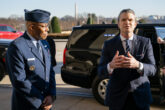August 03, 2018
How The Media’s Narrow Portrayal Of Service Members Does The Military A Disservice
As the American military becomes more isolated from society and society more disconnected from war, public understanding of its military will continue to impact the interest among young people to serve and the burden of war on military members and families. The familiarity gap between the military and society exacerbates contradictory attitudes towards the military community: the military as an institution enjoys incredible public support, but the emergence of ‘generations of war’ given high service rates among children of service members are met with shrinking familial connections to the military. Similarly, public views label veterans as community assets and leaders, but also assume veterans experience PTSD and homelessness. The military is easy to love from afar, but the disconnect ultimately threatens national security.
One way to increase understanding and knowledge about the military among an uninformed public is to leverage the influence of media and entertainment. But both media coverage and the growing ecosystem charity and advocacy campaigns often confuse rather than comprehensively educate the public on the issues facing service members. As a result, the public is left with the cognitive dissonance between narratives that service members and veterans are simultaneously heroes and broken individuals — and this misrepresentation of service members, veterans, and the military experience only serve to perpetuate and compound the so-called ‘civil-military divide.’
While PSA efforts to portray veterans as civic assets with high rates of volunteering, voting, and leadership can shift perceptions about veterans, the most accessible and pervasive depictions of military service and veterans appear in television and film. A recent episode of VICE News—focusing on VET Tv, a dark comedy channel for veterans—is one illustration of an uninformed public. Self-branded as the “first veteran television network full of dark, perverted, inappropriate, controversial, and irreverent military humor,” the relative popularity of VET Tv among veterans highlights the need for varied media options for the veteran community as well as increased public engagement in the effects of recent conflicts.
Read the Full Article at Task and Purpose
More from CNAS
-
National Security Has a Human Capital Problem and There’s No Fast Way Out
National security doesn’t really exist without the military forces and supporting civilians to carry it out. Recruitment remains a problem for the armed forces. And there’s a ...
By Katherine L. Kuzminski
-
The Department of Defense’s Breakthrough Nuclear Moment Risks Slipping Away
Unless they act, the Department of Defense’s breakthrough nuclear moment may vanish before it really happens....
By Will Rogers
-
Sharper: National Security Human Capital
U.S. national security depends on the nation’s ability to leverage the expertise of uniformed warfighters and the highly skilled civilian professionals who develop and impleme...
By Charles Horn & Taren Sylvester
-
Hegseth Brings the Culture War to Combat
The fundamental challenge of military leadership lies in creating cohesive teams that can work together in an environment of mortal risk and, when called upon to do so, use le...
By Dr. Jason Dempsey




